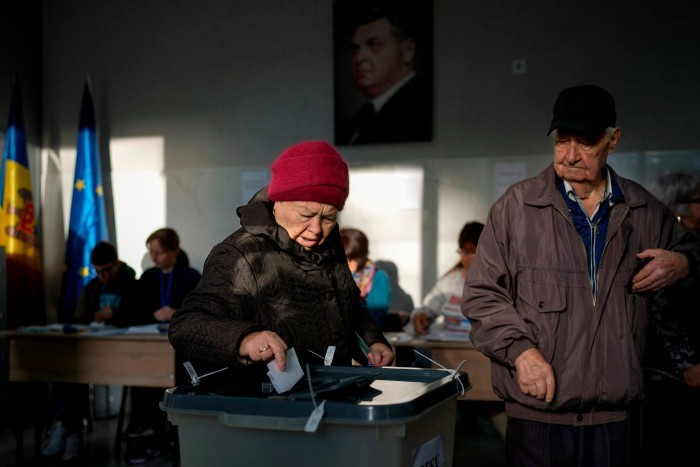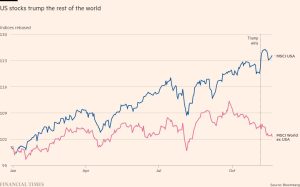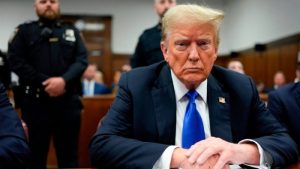‘Unprecedented’ Russian bribery seeks to skew Moldova’s presidential run-off

Unlock the Editor’s Digest for free
Roula Khalaf, Editor of the FT, selects her favourite stories in this weekly newsletter.
A stark warning greeted Moldova’s bus passengers this week, running on repeat over the intercom: “This is the police. If someone offers you money to vote against one of the candidates in the election on Sunday, refuse. If you do not, you will be fined.”
Another came by text message: “Dear citizens, beware of electoral fraud. If someone tries to bribe you, call 112.”
The public alerts form part of an intense campaign by authorities to combat what they say is an “unprecedented” onslaught of illegal Russian money intended to bribe Moldovan voters and skew the result of a presidential election run-off on Sunday seen as decisive for the country’s future geopolitical course.
Incumbent Maia Sandu has promised to use a second term in office to integrate the former Soviet country of 2.5mn further into the EU, with a view to joining the bloc by the end of the decade.
Though her opponent, political newcomer Alexandr Stoianoglo, has also said he supports European integration, his candidacy is formally backed by the pro-Russian socialist party.
In the first round of the vote, held in late October, Sandu suffered an upset when she failed to secure enough votes to win the race outright, pushing it into Sunday’s second round run-off.
A referendum held the same day on Moldova’s bid to join the EU also failed to produce a resounding success for Sandu as the Yes vote won by just a razor-thin margin of 50.35 per cent, carried across the line by diaspora voters casting their ballots at embassies in Europe and the US.
As ballots were still being counted that night, Sandu pointed the blame at “foreign forces” and “criminal groups”, accusing them of attacking the country’s democratic process.
She was echoing warnings repeated for months ahead of voting day by Moldovan police over the magnitude of Russian interference in the election process.

Officials said Moscow was funnelling funds into the country, one of the poorest in Europe, and deploying vast sums — equivalent to 1 per cent of Moldova’s GDP — to develop an elaborate network of proxies that would then recruit and pay potential voters in turn. They said its aim was to sabotage Moldova’s plans under Sandu to eventually join the EU.
While Sandu has described Stoianoglo as the Kremlin’s “preferred candidate”, the former prosecutor-general has denied ties to Russia or any connection to voter bribery. He criticised Russia’s full-scale invasion of Ukraine and positioned himself as an advocate for a more neutral geopolitical course that would balance relations with both Russia and the west.
He has also drawn support from voters unhappy with Sandu’s performance on the economy, which has been weighed down by the energy crisis and an influx of refugees across Moldova’s eastern border triggered by Russia’s invasion of Ukraine.
Officials estimated some $100mn had been spent by Moscow in the run-up to the vote, some of it brought in by “money mules” intercepted by police at the country’s main airport carrying stacks of cash.
But the first round showed that the interference was much deeper and more insidious than the government had initially estimated, said Stanislav Secrieru, an adviser on national security in Sandu’s team.
“It’s much bigger than we thought,” Secrieru said in an interview. It triggered a “hyperactive” response from law enforcement, he said, as authorities rushed to dismantle the cash-for-votes network in just two weeks ahead of the second round and also deter Moldovans from getting caught up in the scheme.
“It’s structured like a financial pyramid. And we were trying to decapitate it,” Secrieru said. Searches were conducted and several key regional leaders were detained. Some of the evidence came, he said, from citizens who had received bribes but were now sharing information with the police.
To deter voters from accepting the cash, Secrieru said, police had been warning Moldovans that the $2,000 fines they could incur if caught were much larger than the money being offered for their votes, usually about $10-$15.

Last week, an undercover investigation by local media outlet Ziarul de Gardă using hidden cameras showed Russian speakers recruiting “activists” among ordinary Moldovans, offering them free trips to Moscow and financial rewards if they each then recruited a further 10 “sympathisers” and brought them to vote.
The reporter in the investigation received a phone call instructing her to vote “against Sandu” — and consequently for her opponent, Stoianoglo — in the second round.
“After the second round, our law enforcement will have a lot of work to do to identify, document and punish everyone who participated in this scheme,” Secrieru said.
On Friday, the Kremlin said it was closely monitoring the second round but reiterated that it strongly denied accusations of voting interference.
Voting kicked off early on Sunday with a substantially higher turnout recorded by 9.30am local time than by the same hour two weeks earlier, when voters cast ballots in the first round.
Long queues formed outside polling stations in Moscow, Bucharest and Istanbul as the Moldovan diaspora, a significant bloc, headed to vote.
Initial results in the second round run-off are expected in the early hours of Monday morning.
Secrieru said Russia was continuing its efforts right up to voting day: “We are in uncharted waters. It’s never happened to Moldova before. We have no reference case.”
#Unprecedented #Russian #bribery #seeks #skew #Moldovas #presidential #runoff





